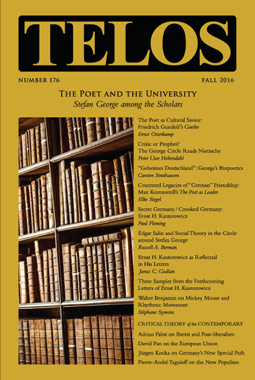By Telos Press · Thursday, October 13, 2016 “When a man fell, the others stood together over his corpse; their gazes met, dark and deep. But when death stood over the trenches like a storm cloud, then it was every man for himself: he stood alone in the darkness, howling and crashing surrounding him, blinded by sudden flashes, with nothing in his breast but endless desolation.”
—Ernst Jünger, Sturm, describing the soldiers awaiting attack during the Battle of the Somme, whose centenary is this year.
Continue reading →
By Telos Press · Tuesday, September 20, 2016 “He tried to imagine how he looked: a trembling bundle in a torn uniform, with a blackened, sweat-streaked face and staring eyes. . . . He stood and tried to calm his nerves through a series of curses. He thought he had talked himself back into heroism, when a new and even more terrible impact hurled him back into his hole. A second that followed immediately upon the first broke off a huge piece of the trench wall and almost buried him. He writhed free from the mass of earth and ran along the trench. No man could be seen at his post. Once he stumbled over a heap of debris under which lay a dead body. Somehow, a long, jagged board had penetrated his body; his eyes, glassy and bulging, stood out of their sockets.”
—Ernst Jünger, Sturm, describing the Battle of the Somme, whose centenary is this year.
Continue reading →
 One often speaks of the importance of poetry for thought, even of poetry as a mode of thinking, and perhaps nowhere more than in Germany, the country of Dichter and Denker, of poets and thinkers. The German intellectual tradition is defined by a long, intimately interwoven relation between poetry and thought going back to the solidification of the Modern Age in the eighteenth century: Klopstock’s “Republic of Letters”; Goethe and Schiller’s Classicism, especially Schiller’s “aesthetic state”; Hölderlin’s “founding poets” and the centrality of poets in “the time of need”; Jena Romanticism’s inextricable relation between “Symphilosophie” and “Sympoesie”; Hegel’s definition of beauty as “the sensible shining forth of the idea”; and onward to this day. One often speaks of the importance of poetry for thought, even of poetry as a mode of thinking, and perhaps nowhere more than in Germany, the country of Dichter and Denker, of poets and thinkers. The German intellectual tradition is defined by a long, intimately interwoven relation between poetry and thought going back to the solidification of the Modern Age in the eighteenth century: Klopstock’s “Republic of Letters”; Goethe and Schiller’s Classicism, especially Schiller’s “aesthetic state”; Hölderlin’s “founding poets” and the centrality of poets in “the time of need”; Jena Romanticism’s inextricable relation between “Symphilosophie” and “Sympoesie”; Hegel’s definition of beauty as “the sensible shining forth of the idea”; and onward to this day.
Continue reading →
By Telos Press · Tuesday, September 6, 2016 “The vastness and deadly desolation of the field, the long-distance operation of steel machines, and the relay of every movement in the night drew an unyielding Titan’s mask over the proceedings. You moved toward death without seeing it; you were hit without knowing where the shot came from. Long since had the precision shooting of the trained marksman, the direct fire of guns, and with it the charm of the duel, given way to the concentrated fire of mechanized weapons. The outcome was a game of numbers: Whoever could cover a certain number of square meters with the greater mass of artillery fire, won.”
—Ernst Jünger, Sturm, describing the Battle of the Somme, whose centenary is this year.
Continue reading →
By Telos Press · Tuesday, August 30, 2016 “When a man fell, the others stood together over his corpse; their gazes met, dark and deep. But when death stood over the trenches like a storm cloud, then it was every man for himself: he stood alone in the darkness, howling and crashing surrounding him, blinded by sudden flashes, with nothing in his breast but endless desolation.”
—Ernst Jünger, Sturm, describing the soldiers awaiting attack during the Battle of the Somme, whose centenary is this year.
Continue reading →
By Andreas Pantazopoulos · Thursday, August 11, 2016 How are we to explain the current “revolt against the elites,” the “new populist wave,” referred to by the French philosopher, political scientist, and historian of ideas Pierre-André Taguieff in a recent interview? What follows will try to reflect on specific aspects of the intimate relationship between populism and nationalism, the import of the conspiracist view of sociopolitical phenomena, and the overall “populist illusion” in the left-wing version of populism, with reference to the Greek experience of the past few years, notably through the Syriza phenomenon. To the extent possible, an effort will be made to examine this against the backdrop of a comparative approach to left-wing populism in general.
Continue reading →
|
|



